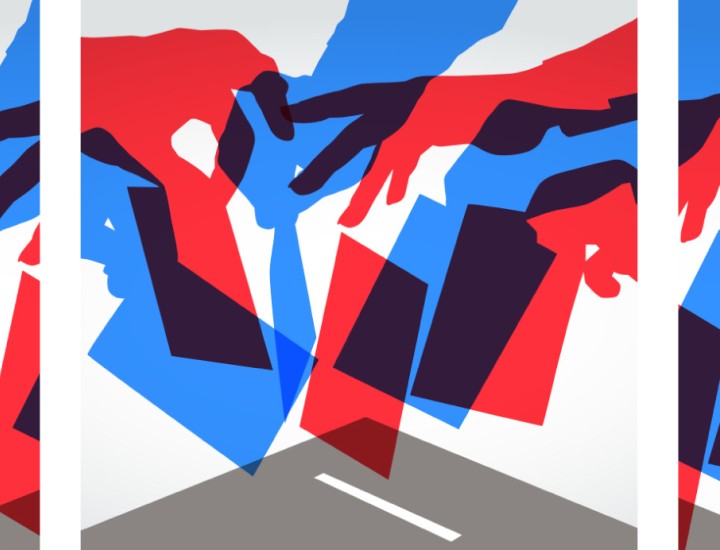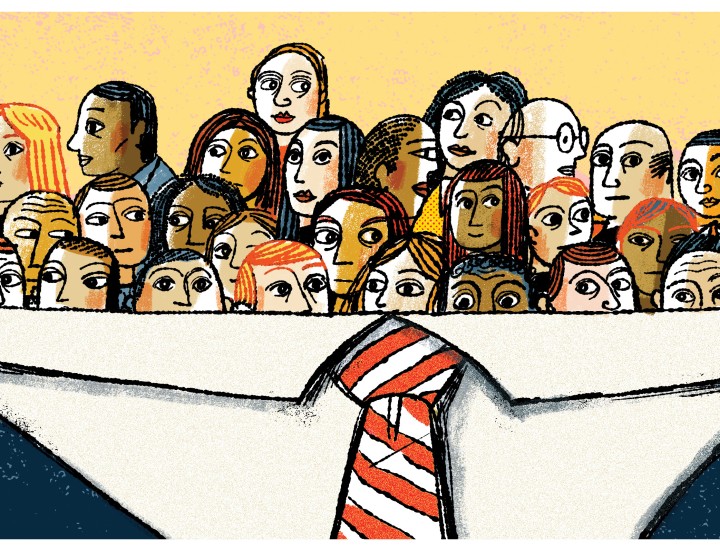Book Excerpt: Can Governments Earn Our Trust?

Below is an excerpt from Can Governments Earn Our Trust?, the newest book by Volcker Alliance Nonresident Senior Fellow Donald F. Kettl published by Polity Books.
--
Earning trust through transparency
The foundation for building trust begins with the argument for transparency. The central idea, developed during the Enlightenment, is that government's legitimacy builds on the consent of the governed. But, to give consent, citizens must know what government is doing and find effective levers of influence. James Madison, one of American's most distinguished founders, and later the country's fourth president, wrote in Federalist 51, part of a series of papers devoted to making the case for the new American Constitution: "If angels were to govern men, neither external nor internal controls on government would be necessary. In framing a government which is to be administered by men over men, the great difficulty lies in this: you must first enable the government to control the governed; and in the next place oblige it to ontrol itself." Of course, men are not angels, so democracy requires ways of helping the governed to control government. That begins, in the minds of many theorists and citizens alike, with the most important and fundamental tool to build trust: transparency.
Analysts often strongly argue, "you can't have trust without transparency." That idea has led reformers to campaign for forcing more government meetings to be open, for making it easier for citizens to gain access to records, and for bringing more sunshine to government's operations. The underlying assumption is that the more information that's available to the public, the more accountable and better-performing government will be. In the United States, the Sunlight Foundation is singularly devoted to making all government information open and available in real time. A global organization, Transparency International, seeks to bring greater openness to governments everywhere, through chapters in more than 100 countries. The Web Foundation has ranked the most transparent countries in the world, with the United Kingdom first, followed by the US, Sweden, and a tie between New Zealand and France. At the bottom of the 86 countries surveyed are Mali, Haiti, and Myanmar.
The logic seems inescapable: citizens will place more trust in organizations whose behavior is more trustworthy - and whose trustworthiness they can readily see. But if the case for transparency seems self-evident, the reality is far more complex for five reasons.
First, the pursuit of "transparency" often flows more from the pursuit of compliance with law than a commitment toward openness. Many governments have created new procedures, ranging from open records and open meetings to open data. Many government agencies end up scrambling to determine how best to comply with the law - and then to get their work done, as a separate proposition. That means they often separate the two streams instead of viewing transparency as how all work gets done. That, in turn, often frustrates citizens, who view transparency as a paper commitment with little real meaning.
Second, transparency often conflicts with other requirements. Agencies inevitably face the challenge of effectively delivering services, winning the political support of important stakeholders, and obtaining the resources they want in a tough environment in which other agencies are fighting in the same space for the same things. Transparency about problems in the past and strategies for the future can undermine, not help, in the rough battles that shape the political world. Feinting and indirection, trial balloons and bluster, are inevitable bits of the political landscape. No matter how devoted a government agency and its leaders might be in principle to transparent government, there are always fierce pressures fighting against full and open disclosure. Government agencies, in fact, are often tempted to be transparent when it helps them, to cover their tactics when oppenness seems dangerous, to sometimes flood the field with more information than anyone could manage, and to focus narrowly on what they must do to comply with the law. What citizens might want isn't always what agencies provide. What information is released and what is not, in fact, are inevitably part of large political strategies.
Third, more transparency can sometimes lead to less trust. A researcher conducted an experiment in Sweden, a high-trust country, and asked those surveyed whether they favored eliminating an in vitro fertilization program to channel more money for adolescent psychiatric services. Making the tradeoff explicit highlighted the underlying value conflicts in the decision, and that lowered trust in health care in general. In fact, those who had no information about the procedures involved had higher trust in the system. Sometimes, more information can produce less trust in government's decisions.
Fourth, not all societies view trust equally. A research team set out to gauge the effect of more transparency on citizens' trust in The Netherlands and in South Korea through web-based experiments. Dutch subjects were surveyed on questions about air pollution; in South Korea, the respondents were asked about theft prevention. More transparency lowered trust in both countries about similar issues - but much more in South Korea than in The Netherlands. The Dutch tend to have a lower power distance between citizens and government officials and a shorter-term horizon for exploring problems. South Koreans, for example, have a greater power distance and tend to take a longer-term view of issues because of the deep influence of Confucianism. The greater the power distance between citizens and their government and the more citizens take a long-term view, the less transparency improves trust, the researchers argued.
Fifth, transparency can be scary, as the famous aphorism reminds us: "Laws are like sausages, it is better not to see them being made." Economist Justin Wolfers concluded that the vast movement toward greater transparency in government's operations in the last generation might also be fueling distrust of its operations. "We actually now get to see," he explained, "into that smoke-filled room where we're seeing the deals being cut." When "you see how sausage is made," Wolfers concluded, "you don't like eating sausage as much anymore." Thus, he said, it might be impossible to recover the levels of trust measured in the 1960s' surveys, precisely because much greater transparency makes it far easier to see government's many warts and blemishes, much more closely. "The political landscape and the technology with which we monitor our government [have] changed," he argued.
Nothing captures the sausage-making analogy more than the recurring wars against "fraud, waste, and abuse" in government. In the US, the unholy trinity has become blurred as a single, blended phrase, which captures both the complexity of government's operations and a cynicism that they inherently don't work well. In Britain, there is a Serious Fraud Office - they don't spend time on just mundane fraud - charged with investigating "fraud, tricks and scams." The perception that fraud, waste and abuse are an inevitable part of government tends, in turn, to feed the drumbeat of criticism about government and to undermine trust. With 24/7 broadcasts to fill, the media have found tales of fraud an irresistible bait. Many reporters see themselves in the mold of Bob Woodward and Carl Bernstein, whose Washington Post investigations of Rich Nixon's abuse of power during the Watergate crisis in the early 1970s helped bring down his presidency. Whistleblowers like Edward Snowden, with his release of documents from deep inside America's Nationals Security Agency, and WikiLeaks, which has distributed a vast supply of purloined papers, have kept that spirit alive. Shining a bright light of transparency into government's nooks and crannies has become a central strategy of reporters. With an unlimited Internet to fill and an ever more complex government providing endless tales of problems, transparency and distrust have become intertwined.
There's no doubt that trust depends on transparency. But there's also no doubt that transparency is a complex concept, and that full disclosure can actually undermine trust. Transparency, in fact, is just as slippery and difficult an issue as trust itself.
Trust: wholesale and retail dimensions
Earning trust therefore requires a far more nuanced approach, one which builds on the fundamental relationship between people and their governments. For centuries, theorists have held that this relationship is a social contract, in which citizens support government in exchange for what government gives to them. In the nineteenth century, Walter Bagehot, the celebrated British essayist, broke that notion into two parts. He argued that the British Constitution depended on two elements: the "dignified" and the "efficient." The role of the dignified, he wrote, is to "excite and preserve the reverence of the population." In the British Constitution, that is the role of the monarch, but all democracies need a taste of dignity. The role of the efficient is to "employ that homage in the work of government." That is the role of the cabinet and the administrators it supervises, and all democracies - indeed, all governments - need that. If citizens become unexcited and unreverential about government, if its dignity erodes, then its legitimacy crumbles. And if government loses the capacity to efficiently carry out its work, public support evaporates. Bagehot thus points to the central role of trust in securing the legitimacy of government, whether it has the blessings of monarchy or not.
That, in turn, sets the foundation for the two important elements of trust in government. Dignity operates at the wholesale level, where trust depends on creating confidence in the ability of government and its institutions, at the highest level, to represent its people and to perform fairly on their behalf. Efficiency operates at the retail level, where trust depends on creating confidence in government's ability to deliver on its policies, fairly and effectively, at the operational level where government connects directly with the people. Trust therefore is not a large, abstract, undifferentiaed idea. Rather, it is a single term that captures a complex set of relationships between government and its citizens, relationships that operate on different levels and that, therefore, create range of challenges.
Those challenges, in turn, create opporuntuines. Most of the polling and analysis about trust in government focuses on the level of system-based, wholesale interactions. Do citizens trust government, as a whole, or individual branches, like Congress? Those opinions are broad, built on interactions over time across a wide array of issues, and are therefore very hard to change. On the other hand, government does not operate just on this broad system level but, rather, on a vast array of individual interactions. It might just be possible to improve those retail-level interactions - to increase their efficiency, in Bagehot's formulation. And if that's possible, it might just be possible to earn trust.

